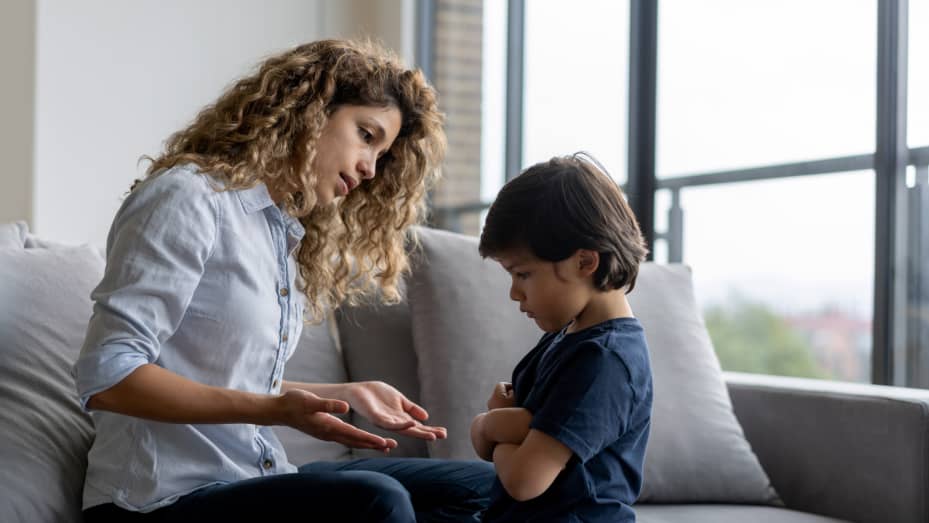10 Ways Divorce Co-Parenting Affects Mental Health
Managing divorce co-parenting can impact your mental health in significant ways. Communication challenges may overwhelm you, hindering effective co-parenting. Handling these obstacles with clear boundaries and coping strategies like active listening is key. The emotional toll can be heavy, but engaging in joyful activities and seeking support can help. Role confusion is common, so setting clear boundaries and prioritizing self-care is vital. Stress and anxiety may arise, but setting boundaries and seeking therapy can assist you. Addressing guilt and self-blame with coping strategies and therapy is essential. Remember, proactive strategies and support can make a difference.
Key Takeaways
- Increased stress and anxiety from navigating new dynamics.
- Emotional toll from balancing co-parenting responsibilities.
- Feelings of guilt and self-blame impacting mental well-being.
- Role confusion leading to emotional strain.
- Communication challenges contributing to mental health struggles.
Communication Challenges

Managing communication challenges in co-parenting after a divorce can be an emotional and overwhelming experience for both parties involved. Communication barriers, trust issues, and boundary setting can all contribute to the difficulty of working through this new dynamic.
It’s important to acknowledge that these challenges are normal and that there are coping strategies that can help you overcome them. When faced with communication barriers, it’s vital to prioritize active listening and open dialogue. Encourage a respectful and understanding environment where both parties feel heard and valued.
Trust issues may arise due to past grievances, but setting clear boundaries and expectations can help rebuild trust over time. Establishing consistent communication methods, such as using a shared calendar or co-parenting app, can also aid in fostering trust and reliability.
Emotional Toll

Managing the emotional toll of co-parenting post-divorce can be a challenging journey filled with highs and lows. It’s important to feel a range of emotions, from sadness and frustration to moments of relief and hope. To navigate this rollercoaster, consider implementing coping mechanisms to help you through the tough times.
Engaging in activities that bring you joy, practicing mindfulness, and journaling your thoughts can be powerful tools in processing your emotions.
Support groups can provide a safe space to share your experiences with others who understand what you’re going through. Connecting with individuals who are on a similar path can offer validation and a sense of community.
Seeking therapeutic intervention from a counselor or therapist can also be beneficial in working through complex emotions and developing healthy coping strategies.
Remember to prioritize self-care practices, such as exercise, adequate sleep, and setting boundaries. Taking care of your mental and emotional well-being is essential during this challenging time.
Role Confusion
Experiencing role confusion in co-parenting after divorce can be a common and challenging aspect of managing this new dynamic. It’s normal to feel uncertain about your responsibilities and boundaries in this changed relationship. Setting clear boundaries is important to navigate these blurred lines effectively. Communicate openly with your co-parent about roles and expectations to minimize confusion and conflict. Establishing boundaries can help create a more structured co-parenting environment, reducing stress and promoting a sense of stability for both you and your children.
When facing role confusion, coping strategies play a significant role in maintaining your mental well-being. Prioritizing self-care and seeking support from friends, family, or a therapist is necessary. Reflect on your values and priorities to realign your focus and establish a sense of purpose within your co-parenting role.
Engaging in stress-relieving activities, such as exercise or meditation, can also help manage feelings of uncertainty and overwhelm. Remember, it’s okay to seek help and take time for yourself as you navigate through this challenging period of role adjustment.
Stress and Anxiety

Getting through the stress and anxiety that often come with co-parenting after a divorce can be challenging but essential for your mental well-being. It’s normal to feel overwhelmed by the responsibilities and emotions that this situation brings. To help manage these feelings, consider implementing coping strategies like setting boundaries with your ex-partner, practicing mindfulness techniques, and seeking therapy options.
Therapy can provide you with a safe space to explore your emotions, develop healthy coping mechanisms, and gain valuable insights into your co-parenting dynamics.
Additionally, joining support groups for divorced co-parents can offer you a sense of community and understanding. Sharing experiences with others who are going through similar challenges can be incredibly validating and provide you with practical advice on dealing with co-parenting stressors.
Remember to prioritize self-care techniques such as regular exercise, adequate sleep, and taking time for activities you enjoy. Taking care of your mental well-being is vital in managing stress and anxiety during the co-parenting journey.
Guilt and Self-Blame
Managing feelings of guilt and self-blame in the context of co-parenting post-divorce can be emotionally challenging but essential for your well-being. It’s common to feel guilty about the impact of the divorce on your children or blame yourself for the breakdown of the marriage. However, dwelling on these feelings can take a toll on your mental health.
To navigate through these emotions, consider therapy options where you can explore these feelings in a safe space and work through them with a professional.
Additionally, coping strategies like journaling, mindfulness, or talking to a trusted friend can help you process and release these burdens.
Self-care practices such as exercise, meditation, or engaging in hobbies you enjoy are vital for maintaining emotional balance.
Building a strong support system of friends, family, or a co-parenting support group can provide you with the understanding and encouragement needed during tough times.
Resentment and Anger

Feeling resentment and anger towards your co-parent is a common struggle many divorced individuals face. These emotions can take a significant emotional toll on your mental well-being if left unaddressed.
It’s essential to find healthy ways to manage and process these feelings to maintain a positive co-parenting relationship and prioritize your mental health.
Emotional Toll of Resentment
Experiencing persistent resentment and anger in a co-parenting relationship can greatly impact your mental health and overall well-being. These emotions, if left unchecked, can lead to increased stress, anxiety, and even depression. It’s vital to acknowledge these feelings and seek healthy ways to cope with them.
Coping strategies such as journaling, mindfulness practices, and talking to a trusted friend or therapist can provide a safe outlet for processing these intense emotions.
Therapy options, such as individual counseling or co-parenting therapy, can also be incredibly beneficial in helping you work through feelings of resentment and anger. A therapist can offer guidance on communication techniques, boundary setting, and conflict resolution skills, which are important for maintaining a healthy co-parenting dynamic.
Managing Co-Parenting Anger
Getting through the challenges of co-parenting can be emotionally taxing, especially when feelings of resentment and anger arise in your interactions with your ex-partner. It’s important to prioritize anger management when dealing with co-parenting dynamics.
Remember, it’s normal to feel angry, but it’s how you handle that anger that matters most.
When dealing with co-parenting anger, effective coping strategies can help you maintain your mental well-being. Consider practicing mindfulness techniques to stay present and manage intense emotions as they arise.
Additionally, engaging in regular exercise or seeking support through therapy can provide healthy outlets for processing and releasing anger.
Communication plays a significant role in managing co-parenting anger. Express your feelings constructively, focusing on ‘I’ statements rather than blaming language.
Setting boundaries and practicing self-care are also essential in creating a more positive co-parenting environment.
Co-Parenting Conflicts
Managing co-parenting conflicts after a divorce can be emotionally challenging for both parents involved. Coping mechanisms and therapy options can provide valuable support during these difficult times. It’s vital to prioritize conflict resolution and establish clear co-parenting boundaries to navigate these conflicts effectively.
When facing co-parenting conflicts, it’s imperative to acknowledge your emotions and seek healthy ways to cope with them. Engaging in therapy, either individually or together with your co-parent, can offer a safe space to express feelings, learn effective communication strategies, and gain insights into managing conflicts constructively.
Setting clear boundaries with your co-parent is key to minimizing conflicts. Establishing guidelines around communication, decision-making, and parenting responsibilities can help reduce misunderstandings and disagreements. Regularly revisiting and adjusting these boundaries as needed can promote a healthier co-parenting dynamic.
Impact on Children

Hey there, understanding how divorce co-parenting affects your children’s emotional well-being is essential.
The dynamics of your relationship with your child during this period can play a significant role in how they navigate these changes.
Child’s Emotional Well-Being
Ensuring your child’s emotional well-being during a divorce is essential for their long-term mental health and stability. Parental support plays a significant role in helping your child navigate the emotional challenges that come with divorce. By providing a safe space for them to express their feelings and concerns, you can help promote emotional regulation and resilience.
Child therapy can also be a valuable resource to support your child’s emotional well-being during this difficult time. A trained therapist can help your child develop coping strategies to manage their emotions and build healthy ways to process their feelings about the divorce.
Encouraging your child to engage in activities they enjoy, spending quality time together, and maintaining a consistent routine can also contribute to their emotional stability.
Parent-Child Relationship Dynamics
Developing a strong and supportive parent-child relationship is essential for children’s emotional well-being during and after a divorce. Important reinforcement plays a crucial role in fostering a sense of security and stability for your child during this challenging time. By acknowledging and praising their efforts and achievements, you can boost their self-esteem and reassure them of your love and support.
Open communication is another key aspect of maintaining a healthy parent-child relationship post-divorce. Encourage your child to express their feelings, concerns, and questions openly and without judgment. By listening actively and responding with empathy, you can help them feel heard and valued, strengthening your bond in the process.
Financial Strain

Managing the financial strain that comes with co-parenting after a divorce can be incredibly challenging and overwhelming. The aftermath of custody battles can leave you not just emotionally drained but financially burdened as well. Dealing with the complexities of child support payments, shared expenses, and ensuring your children’s needs are met can add significant pressure to an already stressful situation.
The financial strain resulting from divorce co-parenting can lead to feelings of anxiety, inadequacy, and uncertainty about the future. It’s crucial to address these concerns head-on to prevent them from escalating into more significant mental health issues.
Seeking financial counseling or mediation services can provide valuable support and guidance in managing expenses and creating a sustainable co-parenting financial plan.
Remember that you aren’t alone in facing these challenges. Many individuals going through similar situations experience financial strain during co-parenting. By actively communicating with your co-parent, setting clear boundaries, and seeking professional help when needed, you can work towards alleviating the financial burden and promoting a healthier co-parenting dynamic for the well-being of both you and your children.
Isolation and Loneliness
Feeling isolated and lonely can have a significant impact on your well-being during co-parenting after a divorce.
Social withdrawal may lead to a sense of disconnection from others, while emotional detachment can make it challenging to maintain healthy relationships.
It’s important to address these feelings and seek support to navigate through this difficult period with resilience and strength.
Social Withdrawal Impact
How can social withdrawal impact your mental health during the process of co-parenting after a divorce?
When you withdraw socially, you may feel isolated and lonely, which can exacerbate feelings of sadness and stress. It’s important to recognize the significance of social support during this challenging time. Engaging with friends, family, or support groups can provide a sense of belonging and understanding.
To mitigate the negative effects of isolation and loneliness, consider implementing coping strategies such as scheduling regular social activities, joining a co-parenting support group, or seeking therapy.
Taking care of your mental health through self-care practices like exercise, mindfulness, and hobbies can also help combat feelings of loneliness. Remember, it’s okay to ask for help and lean on others for support.
Emotional Detachment Consequences
Experiencing emotional detachment during the co-parenting process post-divorce can lead to profound feelings of isolation and loneliness, impacting your mental well-being greatly. It’s understandable that dealing with this emotional detachment can be challenging, leaving you feeling disconnected and alone at times.
However, it’s crucial to remember that you aren’t alone in this experience. To cope with the isolation and loneliness that can stem from emotional detachment, consider reaching out to a support group or therapist who can provide a safe space for you to express your feelings.
Engaging in activities that bring you joy and fulfillment can also help combat these negative emotions. Additionally, practicing self-care routines, such as exercise, meditation, or journaling, can aid in managing feelings of isolation.
Frequently Asked Questions
How Can I Maintain Boundaries With My Ex-Spouse During Co-Parenting?
To maintain boundaries with your ex-spouse during co-parenting, setting clear expectations is essential. Communicate openly but respectfully. Define roles and responsibilities. Stay focused on your child’s well-being. Consistent, healthy communication is key for successful co-parenting.
What Are Some Strategies for Coping With the Emotional Challenges of Co-Parenting?
To cope with emotional challenges in co-parenting, prioritize self-care practices like mindfulness or exercise. Seek emotional support from friends or therapy options for guidance. Establish clear boundaries with your ex-spouse to protect your mental well-being and maintain a healthy co-parenting dynamic.
How Can I Prevent My Children From Feeling Caught in the Middle of Co-Parenting Conflicts?
To prevent your children from feeling caught in the middle of co-parenting conflicts, remember to prioritize their perspective. Use clear communication strategies, set healthy boundaries, and avoid triangulating them in adult issues. Your kids need stability and understanding.
What Are Some Ways to Navigate Disagreements Over Parenting Styles With My Ex-Partner?
To navigate disagreements over parenting styles with your ex-partner, try open communication strategies. Discuss concerns calmly, aim for compromise solutions, and focus on parenting consistency. Conflict resolution is key; prioritize your children’s well-being above all.
How Can I Prioritize Self-Care and Mental Well-Being While Co-Parenting Post-Divorce?
To prioritize self-care and mental well-being while co-parenting post-divorce, set clear boundaries for alone time and practice stress-reducing strategies like mindfulness or exercise. Communicate openly with your ex-partner to guarantee mutual support and understanding.
Conclusion
Remember, co-parenting after divorce can take a toll on your mental health, but you aren’t alone. By seeking support, practicing self-care, and setting boundaries, you can navigate these challenges and prioritize your well-being.
Remember to communicate openly, seek help when needed, and focus on what’s best for your children.
Take one step at a time and remember to be kind to yourself as you navigate this difficult journey. You’ve got this.

Chad Adan Kace, a young dad from Vermont, shares his parenting journey with a touch of humor and lots of love. Father to a lively baby, he explores the joys and challenges of fatherhood through his stories.







